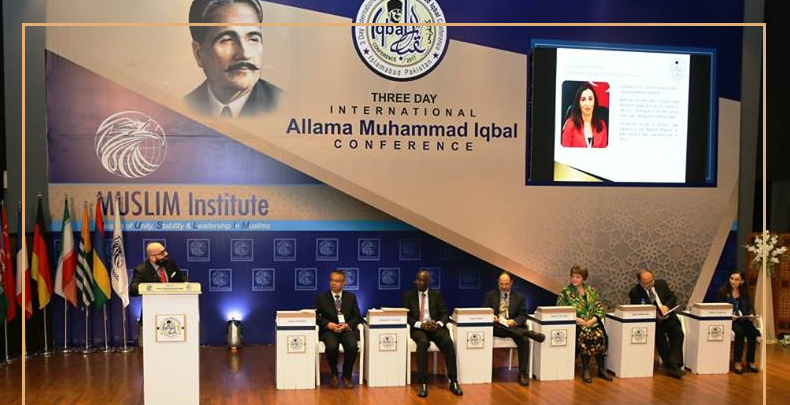
|
THREE DAY
INTERNATIONAL
Allama Muhammad Iqbal
CONFERENCE
(DAY THREE)
|
|






|
|
MUSLIM Institute organized ‘Three Day International Allama Muhammad Iqbal Conference’ at Islamabad on 6-8 November 2017. On 3rd day, three academic sessions were held, a large number of people from academia, social sector, media, diplomats, members of national and provincial assemblies and researchers from different walks of life participated in the Conference. Sahibzada Sultan Bahadar Aziz and Mr. Basit Zia (Research Associate MUSLIM Institute) moderated the proceedings of the conference.
Brief Summary regarding sessions and remarks shared by speakers on 3rd day are observed as under:
|
|
Session 07
Iqbal and Present Era
|
|
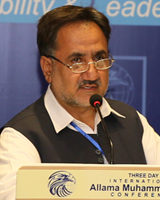
|
Dr. Abdul Rauf Rafiqui
Director, Khan Shaheed Chair, University of Balochistan, Quetta
|
Iqbal's Concept of Ijtihad: Modern Issues of Implementation
In the era of Iqbal, Muslim Ummah was facing an acute deadlock with respect to their socio-political as well as religious decay. However, there was a dire need to work over the reconstruction of Islamic religious thoughts in Islam for the revival of Muslim Ummah. Iqbal mentioned ‘Ijtihad’ in his poetry long before his lecture ‘Al-Ijtihad fil Islam’. Iqbal was well aware of the fact that Islam is a dynamic and practical religion. According to him, economic and political slavery must be abolished for the renaissance of Islamic nations. After that, united institutions of ‘Ijtihad’ should be established for the ideological reconstruction of newly liberated states. He proposed the idea of a parliament under the supervision of time tested religious scholars just like the institution of ‘Ijtihad’. Iqbal foresaw the revival of their disciplined ideology in the Islamic world. His purpose of the lecture ‘Al Ijtihad fil Islam’ was to benefit the institution of ‘Ijtihad’ for Muslim Ummah.
|
|
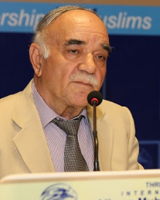
|
Prof Dr. Abdul Shakoor Abdul Sattar
HOD, Department of Persian, National University of Tajikistan
|
A Review of research on Iqbal in Tajikistan
Charm, uniqueness and universality of Iqbal’s poetry had spread across the globe while immersing many nations in its love. Tajik community is among one of such countries. Recognition of Iqbal in Tajikistan commenced in 1958 when Mir Shakar visited Pakistan and brought back ‘Kuliyat-e-Iqbal’ with him. Various scholars had written multiple research articles on Iqbaliyat in Tajikistan. Work of Abdullah Jan is worth mentioning which he had published in the name of Iqbal. He also presented a critique of Persian literature of the Subcontinent in which research regarding the philosophy of Iqbal was included. After 1991, Iqbal’s popularity had a surge when the youth of Tajikistan needed a philosophical torch bearer like that of Iqbal. Iqbal came forward with their demands and his teachings regarding the Recognition of Self (Khudi) rejuvenated the youth of Tajikistan and also proved significant in their freedom struggle.
|
|
|
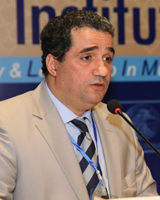
|
Dr. Karim Ahmed Ifrak
Research Specialist at NCSR (National Center for Scientific Research), France
|
Test of Reading in the Thoughts of the Intellectual Guide and Reforming Mohammed Iqbal through his Work “The Reconstruction of Religious Thought in Islam”
The Reconstruction of Religious Thoughts in Islam is, incontestably, the major work of Iqbal rendering intellectual guidance not only for Muslim Ummah but for humanity at large. These include a series of seven conferences, when Allama Iqbal was at the height of his intellect, between 1928 and 1932 in Madras, Hyderabad, Aligarh and London, and during which he analysed the evolution of Muslim philosophy keeping in view the developing contemporary scientific progress. With his great scholarship, he studied theories of different Western scientists as well as Muslim thinkers of various times along with multifaceted objectives in order to refute some prevalent prejudices against Islam and also to shed light on already ignored precepts of the Islamic civilisation. A long time after his death, this innovative academic approach will continue to inspire the generations of thinkers and Muslim students.
|
|
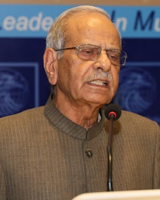
|
Prof. Muhammad Ayub Sabir
Writer & Expert on Iqbal
|
Current Issues of Pakistan and Importance of Iqbal's Philosophical Thoughts
Some of the grave contemporary challenges faced by Pakistan are corruption followed by poverty, although, manifesto of Pakistan movement endorses poverty eradication. Kashmir issue still remains to be settled yet another appalling contemporary challenge is terrorism. We will have to understand the basics of Iqbal’s teachings in order to better tackle these challenges. Fundamental message in Iqbal’s teachings, especially presented in his poem Israr e Khudi is to reveal the secrets of inner self through self-actualization, and also through being the vicegerent of truth. Some other concepts are self-inhalation and the idea of being one nation which is hidden in the concept of Muslim Ummah. According to Iqbal, lack of firm belief is worse than subjugation as he says:
Listen, you captive of modern civilization,
To lack faith is worse than slavery!
|
|
|
|
Interactive Session:
|
|

|
|
In an answer to a question about work on Allama Iqbal in Balochi language, Dr. Abdul Rauf Rafiqi said that the entire work of Iqbal needs to be translated in Balochi language. On a question about capitalist and communist system Prof. Ayub sabir said that confiscation of freedom is the biggest achievement of the devil. In one of Iqbal’s poem ‘The Devil's Conference’, Iqbal discusses different economic and political systems in which devil tells his advisors that he developed both capitalist and communist systems. Iqbal says that Muslims need to act upon principles disseminated by Prophet Muhammad (s.a.w) which are the fundamental basis of Islamic political and economic systems and the devil is afraid of these systems that in the wake of the establishment of these systems, entire world will be following it. In an answer to a question, Sahibzada Sultan Ahmed Ali said that there is a dire need of further research on Iqbal’s lectures. Iqbal’s poetry should be understand in the background knowledge of Iqbal’s lectures. Young scholars need to study his lectures without any bias while studying them fundamentally especially in the perspective of Iqbal.
|
|
|
|
Session 08
Iqbal in Global Perspective
|
|
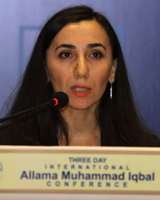
|
Dr. Basira Azizaliyeva
Associate Professor, Azerbaijan National Academy of Sciences, Azerbaijan
|
Allama Muhammad Iqbal & Azerbaijan
Muhammad Iqbal, is always welcomed in Azerbaijan and still his literary heritage is being studied by Azerbaijani researchers. He gave utterance to his sincere thoughts and claimed his adherence to the ideology in his famous work “Bang-e-Dara”: “My fellows, I am Muslim and having a strong faith on the Unity of God, I did believe this truth from the very beginning.” As a renowned philosopher, his globally valuable ideology was highly appreciated in all Muslim world including Azerbaijani literature and philosophy. Studies on Muhammad Iqbal’s works involve three main aspects: 1) Translation 2) Further studies on his literary works particularly his poems. 3) Studies on his philosophical and religious views. All the mentioned aspects entail a number of papers, books and other kind of publications. In recent years, a wide range of researches were carried out in religious, political and social aspects in Muhammad Iqbal’s contributions to literature and philosophy.
|
|
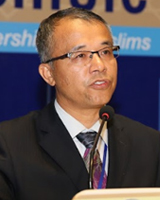
|
Dr. Zhou Chuanbin
Lanzhou University, China
|
Allama Muhammad Iqbal in China: A Brief Review
After the World War II, new China and Pakistan came into being. Both stood up against colonialism. With this back ground, poems of Iqbal were introduced in the China for the very first time. The translation of Iqbal’s poetry can be divided into three stages in China. The first stage is from 1950 to 1970 and the second stage from 1980 to 1990. Chinese scholars are greatly influenced by Marxism understood the philosophy of Iqbal which is based on idealism, and have good understanding regarding Iqbal’s era. Chinese scholars also talk about social and political views of Iqbal as it was said that Iqbal transformed from the Indian nationalism to Islamic internationalism. Third stage is first two decades of 21st century. In this stage, three important manuscripts are published. I hope, the study of Iqbal in china will get further promotion in this regard.
|
|
|
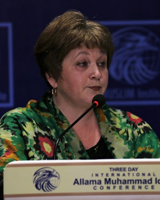
|
Dr. Irina N. Serenko
Senior Research Scholar, Institute of Oriental Studies, Russian Academy of Sciences, Russia
|
Muhammad Iqbal`s Legacy in Russia-Pakistan Socio-Cultural Relations
Muhammad Iqbal`s Legacy has a planetary dimension, as it belongs not only to Pakistan and Muslim world but to all humanity around the world. We may consider him not only a spiritual founder of Pakistan, but also a founder of the socio-cultural links between today’s Russia and Pakistan. When seventy years ago Allama Iqbal`s long cherished dream came true in the shape of Pakistan’s appearance on the political world map. His great personality and legacy started getting association in the USSR with this newly-born independent state. His philosophical and poetical world was the first kind of study which came under the observation of Soviet scholars from Moscow, Dushanbe, Samarkand and other centers of Oriental studies in the Soviet Union. Such prominent scholars as N. Anikeev, L. Gordon-Polonskaya, N. Prigarina, Y. Chelyshev, and others played significant role in reflecting the true sense of Iqbal`s legacy and bringing peoples of both states closer to each other through the process of intercultural dialogue.
|
|

|
Prof. Piotr Kłodkowski
Centre for Comparative Studies of Civilisations, Jagiellonian University, Cracow, Poland
|
Allama Muhammad Iqbal – A Modern Bridge - Builder Between Communities or a Symbol of a Particular Identity? A Polish and European Perspective
Islamabad is like a home where there are many rooms and one room among them is constructed by MUSLIM Institute, which is the room of ‘humanity’. Allama Iqbal is commonly believed to be one of the most eminent persons of the 20th century. Although his poetry and his political involvements are quite well analysed and widely discussed, his philosophical concepts on various aspects of determinism and proposed ideas on the fundamentals of modern democratic systems need re-interpretations in the context of modern transformations of the 21st century. Iqbal’s reference to the European philosophical and ideological heritage (without limiting his inspirations to Bergson’s or Nietzsche’s works) should be critically assessed to rediscover his relevance in the process of cross-cultural and cross-civilizational dialogue which appears to be seriously undermined. Iqbal’s contribution in shaping the contemporary Pakistani identity cannot be denied and his vision of a modern and pluralistic State incorporates global appeal that demands much deeper clarification.
|
|
|
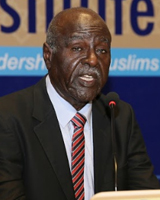
|
Ambassador Ahmad Mohammad Al Shafi
Former MP, Deputy Governor of Greater Dar Fur, Sudan
|
Iqbal’s African Vision: A Sudanese Perspective
I would like to say that such conferences will strengthen bilateral cooperation and will further establish closer coordination between Sudan and Pakistan. I would like to state that you will not feel alien while mentioning Iqbal in the premises of Sudan. The Arab movements especially of Arab-African movement inspired by the message of Iqbal are worthy to mention. Especially, the war of Libya echoes in the work of Iqbal. Similarly, every Sudani is aware of the fact that Iqbal has presented tremendous tribute to Mehdi Sudani, the hero of Sudan’s freedom movement who was a dervish (saint) and liberated Sudan. Iqbal has mentioned Mehdi Sudani in Javed Nama and used the word of ‘Dervish’ for him. In accordance with ideology of Iqbal, Sudan will continue to play its positive role for the economic, psychological and political liberation of the Muslim world. There is no denying the fact that the message of Iqbal is the message of freedom and the message of Muslim brotherhood.
|
|
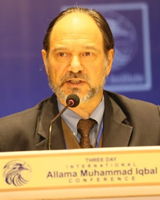
|
Dr. Alan Godlas
Associate Professor, Department of Religion, University of Georgia, USA
|
Remarks by the Chair
Allama Muhammad Iqbal advised us to live in love with each other. Therefore, we should build a bridge with our neighbours and this is a real test. Iqbal writes both about the East and the West. He brought them together and emphasized the contribution of the Eastern people in the development of the West. ‘Haq’ means the right thing and it can also be translated as true reality of God. Allama Iqbal is considered as one of the greatest Muslim thinkers and writers in modern times. First, Allama Iqbal was really inspired from Jinnah to modernize education for Muslims. Second, Ideas of Iqbal are completely harmonious with the idea of global citizenry which has been adopted by UNESCO. Third, Iqbal’s work is based on the theme of peace and social justice. Philosophy of Iqbal can be used by politicians as a tool to develop social and political ideas. Iqbal is a modern bridge builder between the communities. Allama Iqbal stood firm for the freedom, freedom of soul, freedom of mind, and freedom of behaviour.
|
|
|
|
Interactive Session:
|
|

|
|
Iqbal is well known across the world but why he is becoming unknown in the country where he was born? Prof. Piotr Kłodkowski said children need to be taught about Iqbal so that they can become aware of his universal message early in their childhood. Dr. Irina N. Serenko said that if we gathered here in Islamabad and we are discussing the legacy of Allama Iqbal, it speaks true of the universality of Iqbal’s message. By organizing such programs in various schools and universities of Pakistan about the legacy of Iqbal, his message could be disseminated much effectively.
|
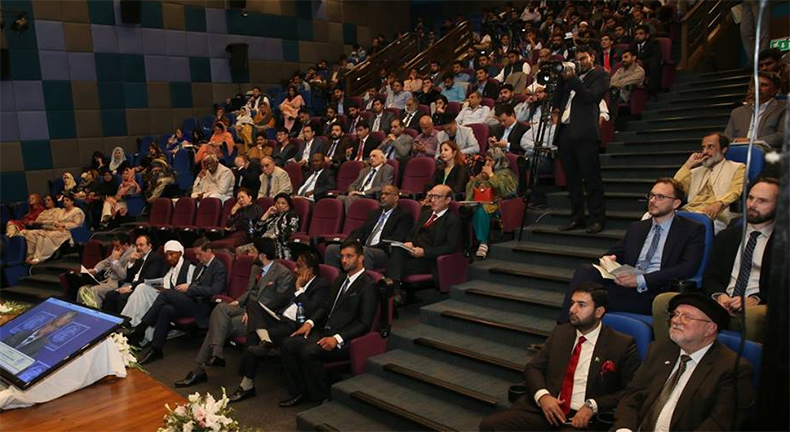
|
|
Session 09
Concluding Session
|
|
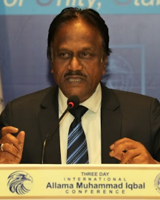
|
Dr. Mahmad Kodabaccus
Secretary General, Parti Mauricien Social Démocrate (PMSD), Mauritius
|
Guest of Honour – 1
Allama Iqbal was a unique personality. Iqbal is not only for Pakistan but for the entire world because he discusses issues pertaining to the entire humanity. People consider Iqbal only in a narrow perspective but he is the poet of entire humanity. Iqbal is not a poet of one century and he will remain alive forever. Allama Iqbal became the voice of the downtrodden and the oppressed one while carrying forward his mission of determination and fearlessness. Chairman MUSLIM Institute’s contribution is of tremendous nature in this respect and whom services are historic as well remarkable. Now, it is our responsibility to disseminate the message of Iqbal to every possible extent.
|
|
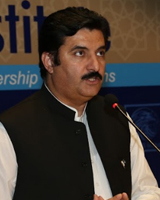
|
Mr. Faisel Kareem Kundi
Former Deputy Speaker National Assembly of Pakistan
|
Guest of Honour – 2
The message of peace and humanity was given to us through philosophical contribution of Iqbal. If we can convey this message to our youth in an effective manner, dream of Allama Iqbal will be fulfilled. If we see in Pakistan, youth needs a direction. Where do they want to go? And what should they follow? The message of Iqbal should be a guiding principle for our youth in this respect. If we follow the dream of Iqbal, we will be following the right path. My utmost prayers are with this Institute in its efforts for the cause of humanity. In this contemporary era, we need to enhance the process of dialogue among the masses in order to promote social ethics.
|
|
|
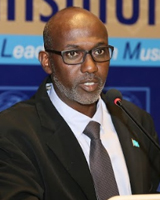
|
H.E. Mr. Abdirahmaan Dahir Osman
Minister of Education, Federal Republic of Somalia
|
Guest of Honour – 3
Contemporary world is facing an acute decline with respect to human ethics and the decay of moral values is the major cause in an increasing environment of hatred across the globe. Allama Iqbal tries to bridge the gap among people by teaching his philosophy of love, peace and harmony. According to Iqbal nationalism based on geographical, ethnic as well as lingual basis hinders cooperation and also gives further rise to prevalent conflicts in the world. Iqbal talks about ideological grounds while teaching mankind to treat one another equally and live peacefully. Similarly, Iqbal’s concept of Khudi or “Self” is universal. In view of Allama Iqbal, there are three steps regarding Self recognition. These include subjugation to Allah, self-restraint and being vicegerent of Allah. Iqbal’s philosophy of love again teaches us that we should not construct unrealistic beliefs about one another that trigger conflict among societies.
|
|
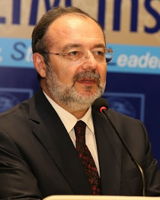
|
Honorable Dr. Mehmet Gormez
Former President, Presidency of Religious Affairs, Turkey
|
Guest of Honour – 4
Allama Iqbal enlightened the Muslims and Muslim Ummah. Iqbal said that people consider him ‘poet’ only, however, reality is that he talks for the betterment of humanity. Iqbal stressed upon the fact that Islamic culture should be identified. An individual who cannot appreciate Islamic heritage, he will be unable to understand the global civilization at large. Iqbal was the reformer of art and literature. He rejuvenated the Islamic ideology and rectified spiritualism. We ought to understand the intellectual and scholarly poetry of Iqbal especially the parts in which he criticized the inaptness of our religious scholars. Our scholars are unable to present real picture of Islam. If Allah decree, persons like Mevlana Shibli Nomani will emerge to propagate the true message of Iqbal.
|
|
|
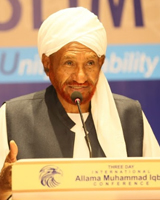
|
H.E. Mr. Alsadig Abdelrahman Almahdi
Former Prime Minister, Sudan
|
Guest of Honour – 5
Legacy of Iqbal possessed various aspects having far reaching effects on awareness of contemporary Muslims. Allama Iqbal urged the Muslim Ummah to wake up and reconsider the spirituality, rationality and the free will demanded by the message of the Holy Prophet (P.B.U.H). Teachings of Iqbal should be published to ensure its wider distribution for the awareness of masses. We should appoint a committee of most authentic scholars and make selections of most important poems of Allama Iqbal and publish them in various important languages in order to inform educational and media programmers. We should call upon the Muslim cabinet encompassing members from whole Muslim community and it should raise itself above from all types of differences and promote dialogue in the pursuit of greater Islamic fraternity. We should appeal for the pursuit of conflict resolution through peaceful political means. Finally, we should call upon the development of relations among Muslim communities establishing a common wealth among them.
|
|
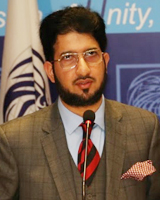
|
Sahibzada Sultan Ahmad Ali
Chairman, MUSLIM Institute
|
Wrap up of the Conference & Vote of Thanks
First of all, I would like to mention the words of Hadhrat Suleiman (a.s) stated in the Holy Quran "This is from the favour of my Lord to test me whether I will be grateful or ungrateful. And whoever is grateful - his gratitude is only for [the benefit of] himself. And whoever is ungrateful - then indeed, my Lord is free of need and generous." I would like to extend my deep and personal gratitude to each one of the distinguished delegates who have accepted our invitation, spared their valuable time from their busy schedules and have joined us in this conference. It is ultimate need of the hour to further explore the frequently discussed aspects of Iqbal’s message and bring forth the less talked about dimensions of his message. With these words I would like to conclude my remarks that every single couplet of Iqbal’s poetry can change the priorities and ways of our lives.
|
|
|
|
|
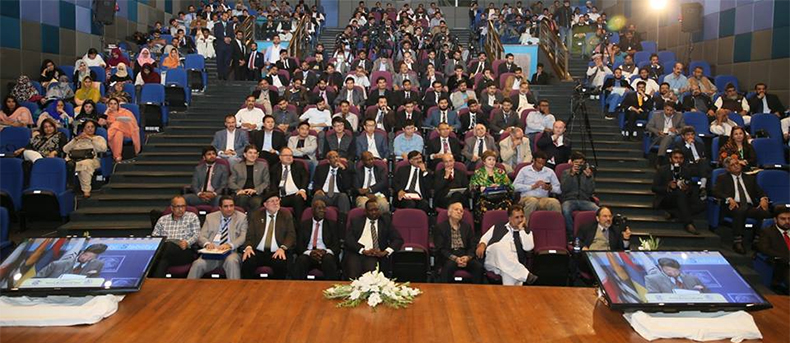
Participants of conference.
|
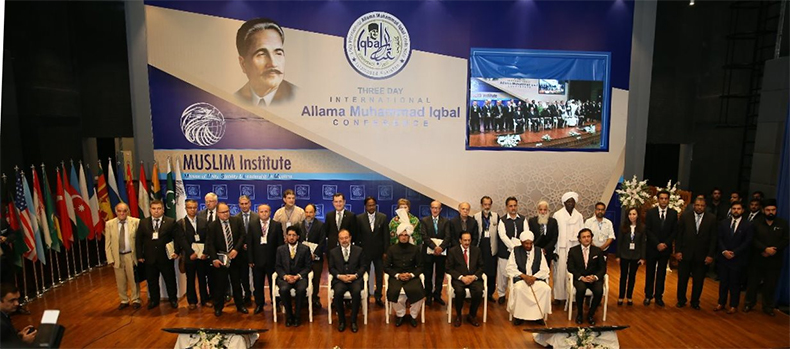
Group photo of all the speakers participated in Three Day International Allama Muhammad Iqbal Conference.
|

Dinner in the honor of Guest speakers and delegates hosted by Kingston Resource Group Pakistan.
|
| |
|
|
|
|
|
| |
|
